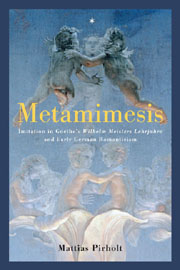Book contents
- Frontmatter
- Contents
- Acknowledgments
- List of Abbreviations
- Introduction
- 1 Romanticism, Mimesis, and the Novel
- 2 Double-Entry Imagery: Johann Wolfgang Goethe's Wilhelm Meisters Lehrjahre
- 3 Imitation and Indolence: Friedrich Schlegel's Lucinde
- 4 Imitation and Simulation: Novalis's Heinrich von Ofterdingen
- 5 Beyond Romantic Representation: Clemens Brentano's Godwi
- Conclusions: Mimesis and the Critical Politics of Romanticism
- Bibliography
- Index
4 - Imitation and Simulation: Novalis's Heinrich von Ofterdingen
Published online by Cambridge University Press: 05 February 2013
- Frontmatter
- Contents
- Acknowledgments
- List of Abbreviations
- Introduction
- 1 Romanticism, Mimesis, and the Novel
- 2 Double-Entry Imagery: Johann Wolfgang Goethe's Wilhelm Meisters Lehrjahre
- 3 Imitation and Indolence: Friedrich Schlegel's Lucinde
- 4 Imitation and Simulation: Novalis's Heinrich von Ofterdingen
- 5 Beyond Romantic Representation: Clemens Brentano's Godwi
- Conclusions: Mimesis and the Critical Politics of Romanticism
- Bibliography
- Index
Summary
Ein Roman ist ein Leben, als Buch. Jedes Leben hat ein Motto — einen Titel — einen Verleger — eine Vorrede — Einleitung — Text — Noten — etc. oder kann es haben. (S II, 599)
A year before he died in March 1801, Novalis outlined in a letter to Ludwig Tieck the plot structure of his novel Heinrich von Ofterdingen: as the first part of the novel draws to a close, his protagonist Heinrich is “zum Dichter reif,” but he will not become “als Dichter verklärt” until the second part (February 23 1800, S IV, 322). Thus, while Heinrich is said to have been born to become a poet — a description that is repeated several times in the course of the story — he is yet to become one. The first part tells the story of Heinrich's experiences and education, which will eventually lead up to the transfiguration in the second part. The process of poeticization, which climaxes in the unfinished second part (where we indeed see proof of Heinrich's poetic talent), does not involve only the individual; the entire world — people, history, future, nature, etc. — should be romanticized and transformed into a work of art.
To be sure, the plot suggested in Novalis's letter, as well as in Tieck's account of the continuation of the story and in the drafts and fragments of the second part, is quite different from the plot of Wilhelm Meisters Lehrjahre, a novel that Novalis, at least as he was working on Heinrich von Ofterdingen, construed as prosaic and as “ein Candid, gegen die Poësie gerichtet” (S III, 646).
- Type
- Chapter
- Information
- MetamimesisImitation in Goethe's 'Wilhelm Meisters Lehrjahre' and Early German Romanticism, pp. 114 - 154Publisher: Boydell & BrewerPrint publication year: 2012



